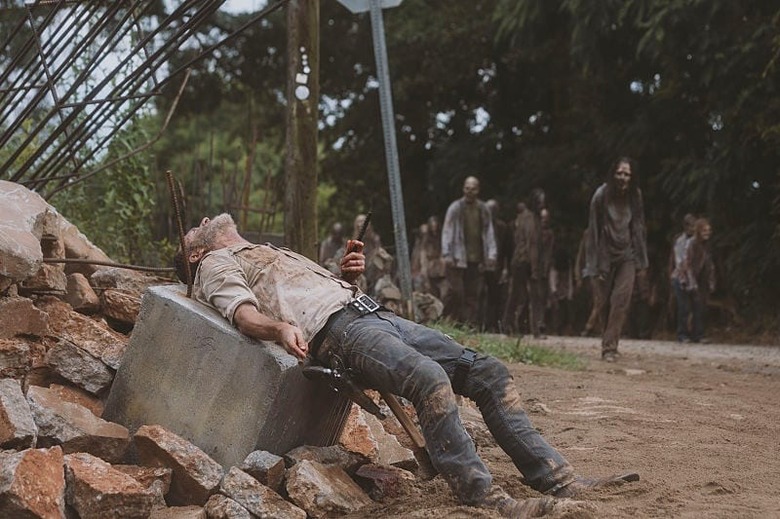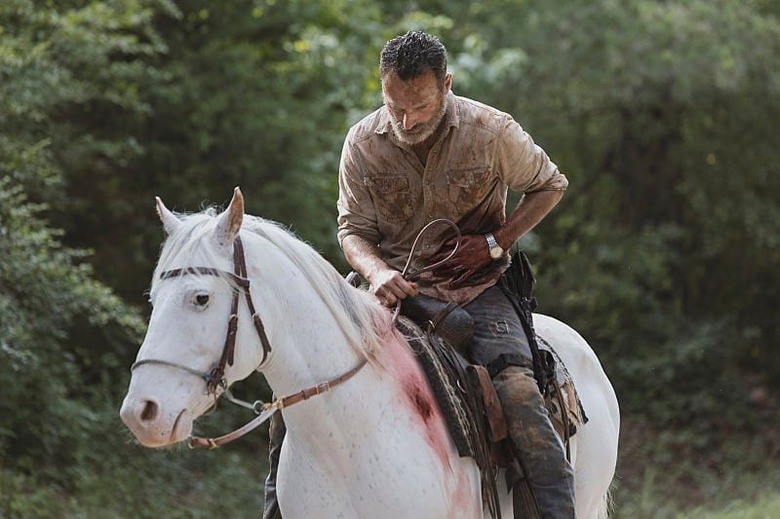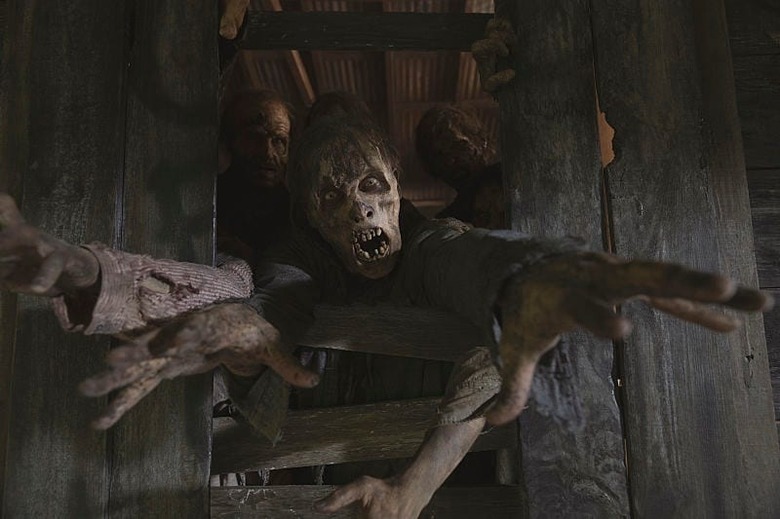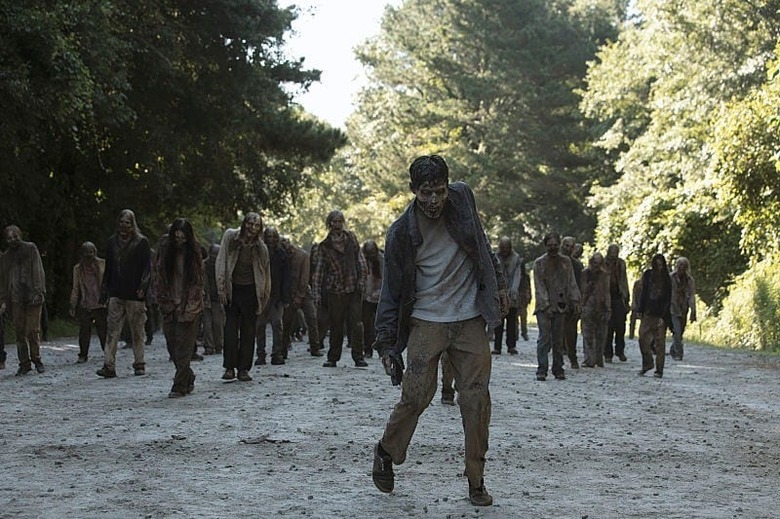The Arc Of Rick Grimes And How The Very Idea That Inspired 'The Walking Dead' Fatally Undermined It
Endings are natural. In its zeal to depict a post-apocalyptic world where no one is safe, The Walking Dead has killed off a lot of characters, so on the surface, it would seem to understand that idea very well. With its revolving door of cast members and showrunners, the show has superficially embraced change, all the while maintaining a certain underlying status quo.
When news broke this summer that the show's star, Andrew Lincoln, would be leaving The Walking Dead in its ninth season, we didn't know what the fate of his character, Rick Grimes, would be. It was probably too much to hope that he would ride off into the sunset. Yet while it might seem like common sense that Rick would simply be fed into the meat-grinder, there was always a chance that the show would find a way to write him off without killing him.
If so, he wouldn't be the first character to disappear and be kept on hand for a later possible comeback. Other Season 1 names like Morgan, Merle, and Morales (remember that guy?) had exited the show, only to reappear seasons later as guest stars or even full-fledged recurring characters. Following last night's episode, "What Comes After," we now know how that squares with Rick's fate. Let's dive into heavy spoilers about Rick Grimes and how his 120-episode arc reflects what is arguably a fundamental flaw in The Walking Dead: namely, its early mission statement to be the "zombie movie that never ends."
The Answer to What Comes After? More of the Same
Rick Grimes lives. After all the hubbub about Andrew Lincoln leaving the show — including a cliffhanger ending last week that left him impaled on a piece of rebar with two herds of walkers converging on his position — it almost feels like Rick's departure from The Walking Dead wound up being more of a TV ratings stunt. Lincoln reportedly wants to spend more time with his family in England, so that's why he's leaving the show, but no sooner did last night's episode air than the news broke this morning that Rick will star in three AMC television movies set in The Walking Dead universe.
Fans bracing for his death and a meaningful send-off to the character had to content themselves with a deus ex machina exit whereby Jadis and her newly introduced walkie-talkie friends carried Rick off in a mysterious helicopter to live another day. "To be continued."
True, we did see Rick being visited by ghosts from his past like Shane and Hershel. As he made his wounded escape from the combined walker herd, Sasha also showed up in his fever dreams. Given that she was not exactly a key relationship in Rick's life (at least not compared to Shane and Hershel), Sasha seems like a strange choice for the role of Rick's spirit guide. It would have made more sense to have Lori or Carl, his wife or son, be there, but maybe the actors were not available or maybe the writers just wanted to emphasize that bit about Rick "finding his family" among the living.
The staging of the bridge sequence was well-done. Having Daryl, the show's new de facto star, stand off on his own, picking off walkers with his crossbow as the others rushed to save Rick, allowed him to share a moment with Rick in a way that felt like a fitting passing of the baton. If the episode had ended right then and there, with the bridge blowing up and Daryl fading into the woods, it might have been more emotionally rewarding and felt like less of a cheat.
As it is, having Rick wash up ashore, only to be whisked away to his own TV movie trilogy does feel like a bit of a cop-out. The timing of his departure, in the middle of a run of episodes as opposed to a season or mid-season finale, also feels like a bid to keep the show's momentum going. With its viewership declining already, some people would probably be less likely to tune back into The Walking Dead if it went on break after wrapping up its main character's story.
Despite feinting at finality, the sense of closure that seemed like it might finally be in sight with this show will only continue to elude long-suffering viewers. The question is, how did we get here? Was it always inevitable that The Walking Dead would reach the point of being unable to let go of itself?
How Rick Matured and Contradicted Himself
The Walking Dead was always most interesting as a metaphor for adulthood. The initial arc of Rick Grimes, how he struggled to retain his humanity amid mounting pressures, offered a fascinating genre take on the journey from innocence to world-weary experience. It's an age-old story that just so happened to play out here in a zombie drama on television.
Of course, Rick's a grown-up when he starts out the show, but he's still got some growing up to do. In the early going (Seasons 1 & 2), he tries to look out for anyone and everyone. At times, his adherence to a moral code is portrayed as stubborn and naive, like he's clinging to some misguided, pre-apocalypse notion of what's right and wrong in a world where survival is now the only thing that matters.
Being forced to draw his gun on other human survivors in a bar and eventually being betrayed by his best friend Shane hardens Rick. He becomes the Ricktator. Losing Lori in Season 3 all but breaks him until he later meets Michonne and is able to rebuild some semblance of a stable family unit with her and Carl.
"Whatever doesn't kill you makes you stronger" ... but there are times when Rick's fierce determination to protect himself and his group at all costs makes it look like he has almost become Shane: growing into the very paragon of self-interest who had acted as a character foil for him. "What Comes After" tipped its hat to this by having a dream version of Shane proudly assert how he had been the chief influence on Rick.
Only by tapping into the rage of his inner Shane sometimes would Rick be able to survive. In the name of safeguarding what's his, he's given himself over to utter savagery on more than one occasion, biting out a man's throat and killing men in their sleep, to name but two examples.
Let's call that the hardline approach. There are definitely times when Rick has taken such an approach in order to deal with potential threats, but the show has always walked him back from the brink of becoming a villain like other protagonists in the Golden Age of TV. One way the show has mitigated Rick's growing callousness is by showing us, time and again, that strangers whose trustworthiness is in doubt are, in fact, cartoonishly evil.
This lets Rick off the hook because he's not killing anyone who doesn't deserve it. A common criticism of The Walking Dead is that its characters' actions often flow from plot contrivance: not from the essence of who they are, but from the visible machinations of the writer's room. Rick's constant flip-flopping, some of the stupid decisions he has made as a leader, might stem from lazy writing sometimes, but they're also consistent with a decent man turned aggressive defender whose conflicting impulses have put him at war with himself and others.
From the end of Season 8 through the beginning of Season 9, we saw a rift grow between Rick, Maggie, and Daryl over Rick's unilateral decision to spare Negan's life and keep him imprisoned. That decision is one that made thematic (if not practical) sense insofar as it offered a compromise for Rick between the opposing doctrines of mercy and wrath.
For a long time, these two forces have been vying for control of his behavior. If you don't credit them as valid within the context of the show — if you don't see how they could tear a well-intentioned apocalypse survivor in two different directions — then it just might make his character seem like a mess of contradicting views and actions.
The Trickle-Down Effect of Rick's Arc
I stopped watching The Walking Dead after Season 7, but the news of Rick's impending departure lured me back (score one for the ratings stunt). Binge-watching Season 8 gave me a greater appreciation for the overarching framework of the season as a whole than I might have had if I had just been casually tuning in from week to week.
Others have argued that Carl's death served no narrative purpose, but if you binge-watch all sixteen episodes with no mid-season break, it's clear that his death was the lynchpin of the entire season. The tree with stained glass panels hanging from it was teased from the very beginning, even being seen as a far-off glint on a hill before we knew the significance of it.
Carl's visions of an idyllic future and the idea of mercy prevailing over wrath were instrumental in getting Rick to re-embrace some of his former idealism. Letting Negan live was Rick's attempt to respect Carl's dying wish and thereby give meaning to his son's death.
The thing is, Rick's arc from cornpone softie to dead-eyed killer and back again has trickled down to other characters, like Carol and Morgan, to the point where it's hardly unique anymore on the world of The Walking Dead. A typical scenario on the show might involve one character trying to dissuade another character from killing indiscriminately. Usually, the person who's playing the moral conscience will say something like, "This isn't you," or, "We don't do this."
An example from last season would be when Jesus tried to convince Tara not to kill the Savior they found hiding in a closet. When Carl was dying from his zombie bite, making his extended, weepy goodbye, Rick told him, "I can't be who I was. It's different now." By the end of the season, he'd be writing Carl a letter, saying, "I forgot who I was. You made me remember."
This ongoing identity crisis — the question of how Rick and the other survivors will define themselves going forward — might have remained more meaningful if The Walking Dead hadn't kept retreading it to the point where it became blase. What we're looking at here, however, is a media franchise with continuance hard-wired into its DNA.
The Limits of Not Having an End
After a while, the very idea that inspired The Walking Dead comic book series is what started to reduce the show to a never-ending cycle of grief and boredom. It's a lesson on the values of finite storytelling. In spite of what they say, maybe it undermines the effectiveness of drama to think that the show must always go on.
In an introduction to the first trade paperback volume collecting issues #1-6 of the series, creator Robert Kirkman wrote:
"For me the worst part of every zombie movie is the end. I always want to know what happens next. Even when all the characters die at the end ... I just want it to keep going. More often than not zombie movies feel like a slice of a person's life shown until whoever is in charge of the movie gets bored. So we get to know the character, they have an adventure and then, BOOM, as soon as things start getting good ... those pesky credits start rolling. The idea with The Walking Dead is to stay with the character, in this case, Rick Grimes for as long as humanly possible. I want The Walking Dead to be a chronicle of years of Rick's life. We will NEVER wonder about what happens to Rick next, we will see it. The Walking Dead will be the zombie movie that never ends."
It's important to remember that The Walking Dead started off with a six-episode first season. In its second season, the show expanded to thirteen episodes, and almost immediately, people started complaining that it wasn't as good as it had been. Still, the show's viewership continued to increase and with its third season, it fell into a pattern of sixteen episodes, divided into two eight-episode half-seasons.
Since then, The Walking Dead has been a show that would best be described as "uneven." It's easy when you've become disillusioned with the show to start dumping on it by default, but over the years, it's had its moments, enough of them that it deserves a more measured, constructive response.
Having said that, when I returned to the show with some distance between myself and it, what I realized was that The Walking Dead is essentially a soap opera that trades in death instead of romance. Because it has so much, well, walking room, the show inevitably gets tripped up in inconsequential subplots. It likes to wallow in hollow sentiments, unearned emotions between supporting characters who are ciphers.
It's a show that frequently suffers from what the Lost fan in me likes to call "the Nikki and Paulo effect," whereby conspicuous new faces are treated as if they've been there all along and are of equal importance to characters with real history on the show. It's one thing to introduce legitimate new characters; it's another thing keep around a bunch of extras and then suddenly pretend that one of these background characters is important enough for the audience to care about.
It's as though you can feel the show's behind-the-scenes mechanics bleeding through on-screen sometimes. Budget cuts were part of what led to all the nastiness between original showrunner Frank Darabont and the AMC network. Watching the show, seeing its core characters sacrifice screen time, it's easy to find oneself wondering whether it is deliberately limiting their screen time simply because it's budgeting its money with those actors.
There have been some long-running primetime shows on television but the most immediate ones that come to mind, like Law & Order or The Simpsons, have been episodic in nature. It's really the model of daytime TV, the serialized melodrama, the soap opera, that The Walking Dead wants to follow. The show General Hospital, for example, has been on TV for over fifty years.
It's not unlike how comic book titles used to be continuously published on a monthly basis until their issue numbers were well into the hundreds. A couple of years ago, Action Comics — the title where Superman made his first appearance back in 1938 — returned to its original numbering so that it was able to hit issue #1000 this summer.
The Walking Dead started out as a comic book. It still is a comic book, but now it's also a television show, one that's drawing from both comic book and soap opera tradition as it lurches along like a zombified version of its former self. Looping in elements like King Ezekiel with his fake dreadlocks, Shakespearean posturing, and CG tiger has strained the show's pseudo-realism and made it feel like even more of a comic book in recent seasons.
There's no telling how long the show will be able to sustain itself without its main character. This was supposed to be Rick's story, but the show has grown out its ensemble and it's always nurtured a clear aspiration toward longevity. The reality is, Andrew Lincoln is an actor, not a comic book drawing. He can't go on forever.
From the minute he woke up in a hospital bed, Rick Grimes was our point of entry into the zombie-infested universe of The Walking Dead. Shuffling around in his hospital gown, he guided us into Robert Kirkman's extended riff on 28 Days Later.
In his absence, the show has lost its longtime anchor and can only hope to regroup around the fan-favorite character of Daryl. It's almost as if the show will become a spin-off of itself without altering its name. With Rick gone, the only real guiding principle it has left is to be "the zombie movie that never ends."
If only that sounded as cool now as it did at the show's outset.




